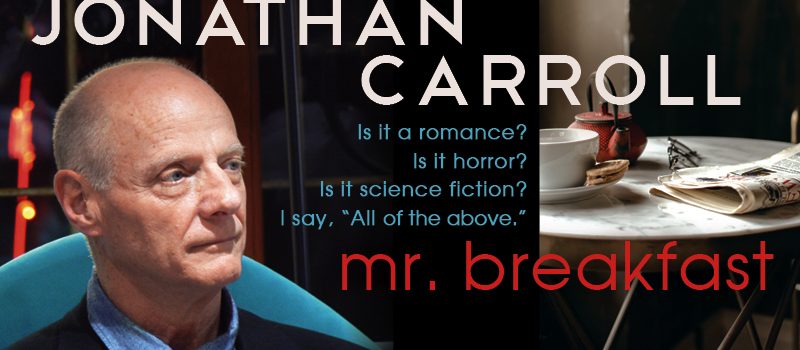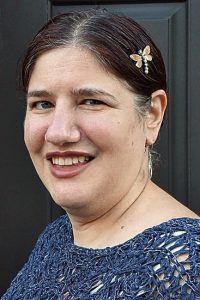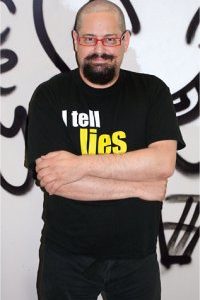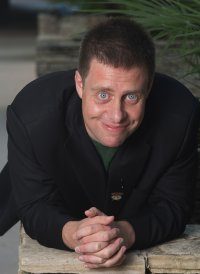Jonathan Carroll: Mr. Breakfast

Jonathan Samuel Carroll was born January 26, 1949 in New York City to famed screenwriter Sidney Carroll and actress June Carroll. He graduated from Rutgers University in 1971 and married artist Beverly Schreiner that same year; they have a son, Ryder Carroll, inventor of the Bullet Journal. Carroll has lived in Austria since 1974, except for a two-year period in Hollywood working on films. He has taught literature at the American International School in Vienna.
Carroll writes literary fiction with fantastic settings, often with elements of horror or surrealism. His first novel, The Land of Laughs, was published in 1980. Many of his books form loose series with recurring characters. His Answered Prayers sequence is Bones of the Moon (1987), Sleeping in Flame (1988), A Child Across the Sky (1989), British Fantasy Award winner Outside the Dog Museum (1991), After Silence (1992), and From the Teeth of Angels (1994). The Crane’s View books are Kissing the Beehive (1998), The Marriage of Sticks (1999), and The Wooden Sea (2001). His Vincent Ettrich novels are White Apples (2002) and Glass Soup (2005).
Standalone novels include Voice of Our Shadow (1983), The Ghost in Love (2008), and Bathing the Lion (2014). His newest novel, Mr. Breakfast, has been published in Italy and Poland, but does not yet have an English-language edition.
Notable short fiction includes World Fantasy Award winner “Friend’s Best Man” (1987); World Fantasy Award nominees “Mr. Fiddlehead” (1989), novella Black Cocktail (1990), and “Uh-Oh City” (1992); and, most recently, “Mama Bruise” (2019) at Tor.com. Some of his short work has been collected in Bram Stoker Award winner The Panic Hand (1995) and Shirley Jackson Award finalist The Woman Who Married a Cloud: Collected Stories (2012). He often publishes short essays online, and some were collected in The Crow’s Dinner (2017).
Carroll lives in Vienna with his wife.
Excerpts from the interview:
“You know the term sui generis? You can’t put a hat on it, so everybody puts their own hat on it. Horror fans look at my books and say, ‘I love the part where the creatures pull the baby elephant through the bars,’ and the romance people appreciate the love relationship parts. I always said that my books are full of different tropes, but they don’t fit a category. When someone says, ‘What kind of books do you write?’, I always say, ‘I write mixed salads.’ You have some lemon and you have some onion and you have some tomato, and then you put your own sauce on top of it, and that’s what makes it what it is. That said, a lot of people don’t like my books for that reason – they go, ‘What is it? Is it an elephant or a potato?’ And it’s neither. It’s both.
“My newest novel, Mr. Breakfast, has been published in Italy and Poland. It’s a kind of a combination of Borges’s ‘Garden of Forking Paths’ and that film Sliding Doors. In so many cases, so many people’s lives would have been profoundly different if they’d taken a little step to the left or to the right. We don’t think about that, because we’re so fixed on right
now and this moment. For example, when I was living in America, I was in graduate school, and my wife had spent a year in Rome at art school. She said to me, ‘Can we go to Europe and teach for one year?’ I said, ‘Sure, I don’t care.’ I had no desire, none whatsoever, to leave America. I was even offered a job at a wonderful university after I got a master’s degree, and I said, ‘All right, I’ll put that aside – let’s go to Europe.’ That was 44 years ago. If we hadn’t gone, I would have probably been a college professor, all that junk. Not that it would have been an unhappy thing. Just different.
“In the middle of the ’90s I went back to America, to LA, to write movies. I was there for two years, and I really liked it. I enjoyed myself, until I realized I hadn’t written a book for two years. I was doing a lot of script doctoring, all that stuff, and I said, ‘I’d rather go back to Europe – not only back to my family, but back to that kind of life.’ Would that have happened to me if I hadn’t married who I did? No, it’s Sliding Doors.
“Apart from a prehistoric reptile, the two lives the guy is offered in Mr. Breakfast are both pretty nice. It’s not like one’s a garbage man and the other one’s a king. On the one hand, the guy can be a renowned artist, but he’s alone and he has nothing but his art; while in the other life he has a wonderful nuclear family who loves him, but he’s an average-Joe everyman. There’s nothing wrong with that – it’s nice to be loved.
“I know I can start a book when I either have the title or the first sentence, and sometimes that changes. My last novel published in English, Bathing the Lion, was originally called The House Inside the Horse. If you’ve read Bathing the Lion, you know I use that line as the name of a children’s book – it didn’t work as well as I wanted for the novel overall. But usually the title stays and I come up with it early, and the first line stays. The first line of Bathing the Lion is, ‘Most men think they’re good drivers. Most women think they’re good in bed. They aren’t.’ I remember having coffee at a cafe in Vienna one day, and that line came to me, and I almost spat the coffee out of my nose because it made me laugh so much. I have no idea where the line came from – it came from Mars – but I said, ‘I’ve got to use that.’ Then I can write the book. The Polish publisher wanted to call my new book The Breakfast Tattoo. I said, ‘Don’t you dare.”‘
“The ending of Mr. Breakfast made me cry. That’s happened twice in my career, once at the end of The Wooden Sea, and this one. I had to have my hip replaced a few years ago, and I spent time in a hospital, just looking around at the different people who were coming and going and the patients, and it was quite an experience. That final scene in the new book – I’m not giving anything away – is set in the hospital, and it brought back so many memories. The idea that these two characters are going up, sending this elevator to the ones they loved – I cried. In my head I thought there was going to be a little bit more to the book, but I realized that was the perfect way to end it. The elevator doors close – boom, it’s done.
“I’ve been accused forever of having terrible endings. My father-in- law, rest in peace, once said to me, ‘I loved the book The Land of Laughs until the dog started talking.’ I said, ‘Well, that’s where you go left and I go right.’ You can’t please all the people all the time. I go with the C.S. Lewis quote: ‘Write the kind of books that you’d like to read.’ When I’m writing, very often I’m one of those guys who doesn’t know what’s going to happen from page to page, but I often step out of myself and say, ‘What would Jon the reader be interested in at this point?’ For example, in Mr. Breakfast, there’s this scene where the autistic girl is in the garden dancing with the dogs, and that scene brought tears to my eyes – not because I was such a genius at writing it, but I just loved that image of an untouchable person in concert with animals. Many autistic people are very comfortable around animals. The reader in me took over then, and he was touched, and I thought, ‘Okay, I like this – I want to keep this.’ Somebody else may say it’s schmaltzy or inappropriate to that moment, but as a reader and as a writer I liked what I did there.
“I’ll tell you a story. When I was in college, I was the editor of the literary magazine, and the first meeting I had with my staff, I said, ‘We’re not going to put the names of any of the editorial staff on the front page. We’re just going to put our student numbers, and we’ll use numbers for all the submissions that come in, too. They will not be by Joe Shmoe, they’ll be by 507671.’ There was a big outrage, everybody’s yelling and screaming, ‘Why?’ ‘Because,’ I said, ‘let’s judge the entire magazine, the fiction and the poetry, on the basis of how good or bad it is, not because Joe wrote it or Shakespeare or whoever.’ The same thing is true about my book, or anybody’s books. What matters is: Did you like it? Whatever it is, did you like it? It’s personal taste. I’m going to give you a bite and it’s going to be cockroaches. You might say, ‘I don’t eat cockroaches.’ ‘Well, just try it prepared this way, you might be satisfied.’
“The Polish writer Stanislaw Lem and I were very friendly many years ago, when he lived in Vienna. Lem told me about the most famous publisher in Germany, which is called Suhrkamp. Suhrkamp is like the Alfred Knopf of Germany – it publishes Peter Handke and all these bigshots. They also have a line called the Phantastische Bibliothek, which is all the fantastical writers like Cortázar, Borges, Lem, and so on. The problem is, the books from that line all come out in paperback, and they are all pink. So basically, you can recognize them when you walk into a bookstore just by sight – ‘Oh, there are the fantastic books, over there.’ Lem was spouting off once to me about it. He said, ‘I’m not read by a lot of people in Germany, which is a big audience, because they don’t like the pink books. They don’t read the pink books.’ And just… me, too. Being published by Phantastische Bibliothek is both a compliment and a slap in the face. You’re taken by Suhrkamp, but they put you in the kiddie pen. People who see those pink books have a bias one way or the other before they even open one. The same thing is true about my own work. Is it a romance? Is it a horror? Is it science fiction? I say, ‘All of the above.'”
Interview design by Francesca Myman. Photo by Mateusz Kudła under CCSA 3.0 license.
Read the full interview in the March 2021 issue of Locus.
 While you are here, please take a moment to support Locus with a one-time or recurring donation. We rely on reader donations to keep the magazine and site going, and would like to keep the site paywall free, but WE NEED YOUR FINANCIAL SUPPORT to continue quality coverage of the science fiction and fantasy field.
While you are here, please take a moment to support Locus with a one-time or recurring donation. We rely on reader donations to keep the magazine and site going, and would like to keep the site paywall free, but WE NEED YOUR FINANCIAL SUPPORT to continue quality coverage of the science fiction and fantasy field.
©Locus Magazine. Copyrighted material may not be republished without permission of LSFF.








